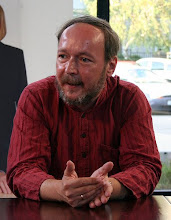
During my programme in India I shall try to do some pieces of atypical advocacy work, where I can also use my late professional background in theoretical physics. The idea came from prof. Amita Dhanda who kindly convinced me that the scientist me is still accessible and can be used to challenge the foundational grounds of the one-sidedly biomedical approach in psychiatry.
As part of this atypical advocacy I shall lecture in universities, starting with a presentation at the Department of Philosophy of the Central University of Hyderabad on 31 July (see photo).
The Department is eminently known in the country for research in diverse fields of philosophy. It has been recognised by the UGC as a Department of Special Assistance since 1987. The thrust areas of research under this programme are (1) Philosophy of Language: Indian and Western: (2) Cognitive Science (including Logic and Philosophy of Mind). The Department has also received grants under ASIHSS for a period of five years since April 2006 to March 2011. The thrust areas under this scheme are (1) Philosophy of Science and (2) Moral and Political Philosophy – both from Indian and Western Perspectives. In addition to these, the Department also carries on research in Philosophy of Wittgenstein, Contemporary Western Philosophy, and systems of Indian Philosophy like Nyaya and Buddhism.
The abstract of my lecture follows here:
Changing Paradigms and Competing Influences in Physics and Psychiatry
Gabor Gombos,
Visiting Ashoka Fellow, Bapu Trust, Pune, India; Senior Advocacy Officer, Mental Disability Advocacy Center, Budapest, Hungary
With the onset of quantum theory in the early twentieth century, physics proposed healthy skepticism as an integral way of doing science. In doing so physics departed from the Newtonian paradigm of: Cartesian causality; objectivity of the observer and the observation process; and acknowledged uncertainty as an inherent characteristic of existence; interdependence of observation and observed; and probabilistic interpretation of causality.
Unlike the Newtonian paradigm which had an overarching influence on all fields of knowledge including psychiatry; the “Quantum Paradigm” has remained marginal to the knowledge making process. This is particularly problematic in the case of psychiatry because of the current hegemony of the biomedical school. This school operates on the theoretical assumption that all mental phenomenon are caused by molecular interactions and yet ignores the “Quantum Paradigm” even when any molecular level description cannot be done without relying upon quantum theory. And thus Biomedical Psychiatry has retained a paradigmatic inconsistency in its knowledge formation.
Relying on Kuhnian framework the speaker will elaborate on the Quantum Paradigm developments in physics and will challenge the Newtonian foundations of Biomedical Psychiatry.
Gabor Gombos,
Visiting Ashoka Fellow, Bapu Trust, Pune, India; Senior Advocacy Officer, Mental Disability Advocacy Center, Budapest, Hungary
With the onset of quantum theory in the early twentieth century, physics proposed healthy skepticism as an integral way of doing science. In doing so physics departed from the Newtonian paradigm of: Cartesian causality; objectivity of the observer and the observation process; and acknowledged uncertainty as an inherent characteristic of existence; interdependence of observation and observed; and probabilistic interpretation of causality.
Unlike the Newtonian paradigm which had an overarching influence on all fields of knowledge including psychiatry; the “Quantum Paradigm” has remained marginal to the knowledge making process. This is particularly problematic in the case of psychiatry because of the current hegemony of the biomedical school. This school operates on the theoretical assumption that all mental phenomenon are caused by molecular interactions and yet ignores the “Quantum Paradigm” even when any molecular level description cannot be done without relying upon quantum theory. And thus Biomedical Psychiatry has retained a paradigmatic inconsistency in its knowledge formation.
Relying on Kuhnian framework the speaker will elaborate on the Quantum Paradigm developments in physics and will challenge the Newtonian foundations of Biomedical Psychiatry.

No comments:
Post a Comment